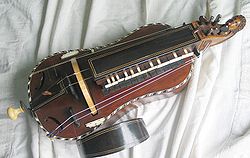Why, he asks, do so many reduplicative expressions or near-reduplicative expressions start with “h” (“hillbilly,” “hippy-dippy,” “handy-dandy,” “hanky-panky,” “hocus-pocus,” “hoity-toity,” “hoodoo,” “hotsy-totsy,” “hully gully,” “humdrum,” “hurdy-gurdy”), beating out the runner-up, “w”?
His answer:
“You will note that many of those ‘h’ expressions refer to disorder and jumblement. Most are of unknown origin. (No matter what you may have learned at your mother’s knee, ‘hunky-dory’ probably does not come from a street in Yokohama where sailors could find a bit of all right.) They’re the sort of expressions that people pull out of the air to convey something otherwise indefinable, like ‘whatchamajig.’ ”
The English language is packed full of phrases that contain pairs of rhyming or alliterating words - often just because the person who coined them liked the sound of them; for example, hocus-pocus, the bee's knees, riff-raff etc.
hurdy-gurdy
手搖琴,又稱絞弦琴,是一種見於歐洲各地的古老弦樂器,通過樂手轉動樂器上的手柄,聯動腹腔內樹脂包裹的輪子來摩擦琴弦,從而震動發聲。手搖琴有多個伴音絃,因此可以產生一種類似風笛的持續音,而實際上在奧克西塔尼亞、加泰隆尼亞、卡津、坎塔布里亞和匈牙利的民間音樂中它就常常和風笛交替使用。
[ MASS NOUN] informal, humorous 詭計;巧手
informal
[ MASS NOUN]
“You will note that many of those ‘h’ expressions refer to disorder and jumblement. Most are of unknown origin. (No matter what you may have learned at your mother’s knee, ‘hunky-dory’ probably does not come from a street in Yokohama where sailors could find a bit of all right.) They’re the sort of expressions that people pull out of the air to convey something otherwise indefinable, like ‘whatchamajig.’ ”
The English language is packed full of phrases that contain pairs of rhyming or alliterating words - often just because the person who coined them liked the sound of them; for example, hocus-pocus, the bee's knees, riff-raff etc.
hurdy-gurdy
 | |
| 樂器別名 | 手搖琴 |
|---|---|
| 分類 | 弦樂器 |
手搖琴,又稱絞弦琴,是一種見於歐洲各地的古老弦樂器,通過樂手轉動樂器上的手柄,聯動腹腔內樹脂包裹的輪子來摩擦琴弦,從而震動發聲。手搖琴有多個伴音絃,因此可以產生一種類似風笛的持續音,而實際上在奧克西塔尼亞、加泰隆尼亞、卡津、坎塔布里亞和匈牙利的民間音樂中它就常常和風笛交替使用。
hanky-panky
Pronunciation: /haŋkɪˈpaŋki/
NOUN
Origin
Mid 19th century: perhaps an alteration of hokey-pokey.
hokey-pokey
Pronunciation: /həʊkɪˈpəʊki/ NOUN
Origin
Late 19th century: of unknown origin.
For editors and proofreaders
hocus-pocus
Pronunciation: /həʊkəsˈpəʊkəs/
NOUN
Origin
Early 17th century: from hax pax max Deus adimax, a pseudo-Latin phrase used as a magic formula by conjurors.
More
- hanky-panky from mid 19th century:People have been talking in disapproving terms of hanky-panky since the 1830s. Then it tended to mean ‘trickery’ or ‘dishonest behaviour’, whereas since the 1930s it has mainly referred to sexual indiscretions. The word is possibly an alteration of hocus-pocus, which was said by conjurors as they performed their tricks, rather like ‘abracadabra!’. This appeared in the early 17th century based on a pseudo-Latin phrase hax pax max Deus adimax used by conjurors as a magic formula. Hoax (late 18th century) may be a shortening of hocus-pocus.
沒有留言:
張貼留言